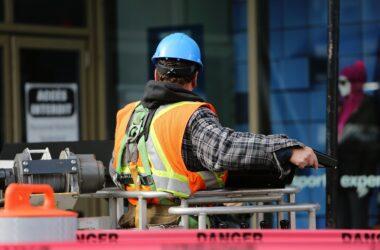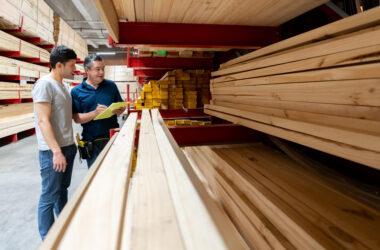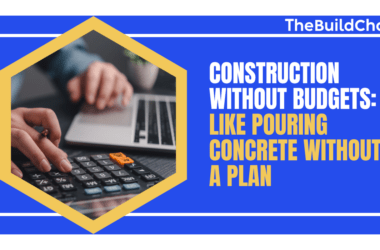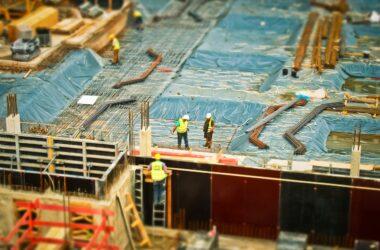Procurement plays a pivotal role in construction by orchestrating the materials, labour, and innovation required to turn architectural ideas into tangible structures.
When every project has its own unique challenges, best practice for construction procurement is important. It’s not just about acquiring the right materials at the right price, it’s about optimising processes, mitigating risks, and fostering collaboration that transcends contractual obligations.
In this blog post, we’ll delve into the art of acquiring, managing, and delivering success in construction, one best practice at a time.
An Introduction to Construction Procurement
Construction procurement brings together the materials, skills, and resources needed to create buildings. However, construction procurement is far more than just buying things, it’s a strategic journey that can make or break the success of any project.
The right procurement strategy can lead to cost savings, timely completion, and superior quality. Meanwhile, poor procurement decisions can result in delays, budget overruns, and compromised quality.
Project Initiation
Every successful construction project begins with a strong project initiation where goals, objectives, and scope are carefully defined.
Setting clear goals and objectives ensures an understanding across the entire team of what success looks like. Defining the scope ensures everyone is on the same page about what’s included and what’s not.
With goals and scope in place, it’s time to figure out what is required to make the project happen. What materials, machinery and labour are required to complete the project? Identifying these needs early is crucial because it guides your procurement strategy.
Establishing budgets and timelines at this stage can help you stay on track and avoid surprises along the way.
Project initiation lays the foundation for a successful construction project. It’s about knowing what you want to achieve, what you need to achieve it, and making sure you have the time and money to get there. Without this solid start, problems can arise.
Procurement Methods
It’s essential to consider the strategies you will use to obtain the goods, services, or works needed for a construction project. Different methods offer varying degrees of control, flexibility, and risk-sharing between project owners and contractors.
Some procurement methods include:
- Traditional Procurement: involves separate contracts for design and construction; a designer is hired to create detailed plans and specifications, then a contractor is selected through a bidding process to execute construction based on these plans
- Design-Build (DB): here the project owner selects a single design-build team to handle the design and construction phases
- Construction Management at Risk (CMAR): a Construction Manager is hired during design to provide input on constructability, cost estimates, and scheduling
- Construction Management as Advisor (CMa): similar to CMAR, but the Construction Manager serves as an advisor rather than a risk-bearing contractor
Each procurement method has its own pros and cons, and different methods will suit different project types. The following must be considered:
- Project complexity
- Project owner expertise
- Time constraints
- Budget
- Risk allocation
- Desired level of control
- Prior relationships
- Legal & regulatory requirements
Pre-Qualification & Vendor Selection
Vendor selection should begin with a thorough pre-qualification process where potential vendors are evaluated based on experience, financial stability, technical capabilities, and adherence to safety and quality standards.
This process acts as a filter, ensuring that only qualified, reputable and reliable vendors advance to the next stage. Price, quality, and past performance are then considered alongside alignment with project objectives and values.
The ultimate goal should be to form a collaborative partnership with vendors who not only offer competitive pricing but also share a commitment to the project’s success, safety, and sustainability.
By establishing a thorough pre-qualification and vendor selection process, construction procurement can ensure that the right partners are selected, setting the stage for a successful, well-executed project.
Bid Documents & Tendering
Creating strong bid documents and conducting a transparent tendering process are the cornerstones of effective construction procurement.
Bid documents should be comprehensive, containing detailed project specifications, scope, timelines, and quality expectations.
They should also provide a level playing field, ensuring that all potential bidders receive the same information.
Transparency is key during the tendering process, which involves inviting and evaluating bids from multiple vendors.
This process should be well-documented and adhere to legal and ethical standards. By fostering transparency and providing precise bid documents, construction procurement ensures that vendors have a clear understanding of project requirements, leading to competitive pricing, reduced disputes, and ultimately, the successful execution of the project.
Contract Types & Agreements
Selecting the most suitable contract type and crafting a well-structured agreement is akin to laying a sturdy foundation. Best practice here involves a careful evaluation of the project’s complexity, risks, and objectives to determine the appropriate contract type, be it lump sum, cost-plus, or another variant.
Once chosen, the contract should be detailed, outlining roles, responsibilities, payment terms, change order procedures, and dispute resolution mechanisms.
A well-drafted agreement sets clear expectations, minimises misunderstandings, and promotes trust among all parties involved.
A good contract is a roadmap for the project, ensuring everyone is on the same page and aligned toward the common goal of delivering a successful construction project.
Risk Management
Effective risk management in construction procurement involves a systematic approach to identifying, assessing, mitigating, and monitoring risks throughout the project lifecycle.
It begins with a comprehensive risk assessment, considering factors such as project complexity, environmental variables, and regulatory compliance. Then, a risk management plan is developed, outlining strategies for risk avoidance, transfer, mitigation, or acceptance.
It’s essential to allocate responsibilities clearly, so all project stakeholders understand their roles in managing specific risks. Regular monitoring and proactive adjustments to the risk management plan ensure that potential issues are identified and addressed in a timely manner.
By incorporating robust risk management practices, construction procurement not only safeguards project objectives but also enhances overall project resilience and success.
Procurement Ethics & Sustainability
Procurement ethics and sustainability are more than just a box ticking exercise. A proactive stance on sourcing materials and services from environmentally responsible vendors and ensuring fair labour practices is needed.
Sustainable procurement practices extend to favouring materials with lower environmental footprints, encouraging energy-efficient construction methods, and adhering to green building standards.
By embedding sustainability and ethical principles into procurement, the construction industry not only minimises its environmental impact but also contributes to a more equitable and sustainable future.
Procurement Technology
Embracing modern procurement technology, particularly digital procurement platforms, can streamline processes, enhance efficiency, and foster collaboration amongst project stakeholders.
Digital procurement platforms offer centralised data management, real-time analytics, and automated workflows, reducing manual errors and optimising decision-making. They facilitate seamless communication, ensuring all parties are on the same page, which is vital in construction.
Procurement platforms can also bolster transparency, from supplier selection, to contract management, enhancing accountability and reducing the risk of disputes.
The benefits are far reaching, including cost savings, shortened project timelines, and improved project outcomes.
Read more: How To Get The Most From A Digital Procurement Solution
Vendor Performance and Quality Assurance
Vendor performance and quality assurance can safeguard the integrity of a construction project. As discussed previously, this process begins with careful vendor selection. Once vendors are onboard, continuous monitoring and evaluation ensure they meet agreed-upon milestones and quality benchmarks.
Quality assurance processes, such as inspections and testing, must be integrated throughout the project’s lifecycle to identify and rectify issues promptly.
Clear communication and collaboration between project owners and vendors are vital to ensure that quality remains uncompromised. The goal is to deliver construction projects that not only meet but often exceed quality expectations, fostering trust and long-term partnerships within the construction ecosystem.
Construction Procurement Made Easy with The Build Chain
The Build Chain offers a solution that transforms the process of purchasing materials and hiring equipment for contractors. Our platform makes it easy to adopt best practice in construction procurement in the following ways:
- Increase efficiency: by submitting just one enquiry form for materials which is automatically matched with appropriate suppliers, contractors can save a huge amount of time and introduce more efficiency into the procurement process
- Reduce costs: comparing all quotes in one single dashboard allows for easy, accurate comparison of quotes, ensuring best value is achieved every time
- Sustainability: enquiries are sent only to suppliers within a 30 mile radius, making it easy to purchase materials locally and reduce the carbon emissions associated with transporting them – each quote also includes an ESG percentage saving
Why not try it for yourself? Book your demo and free trial today!





